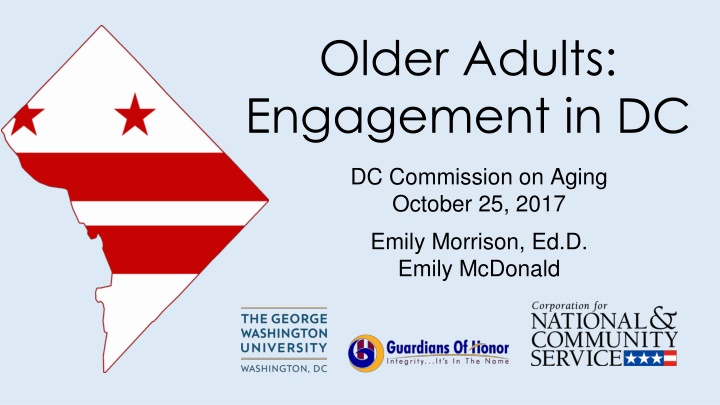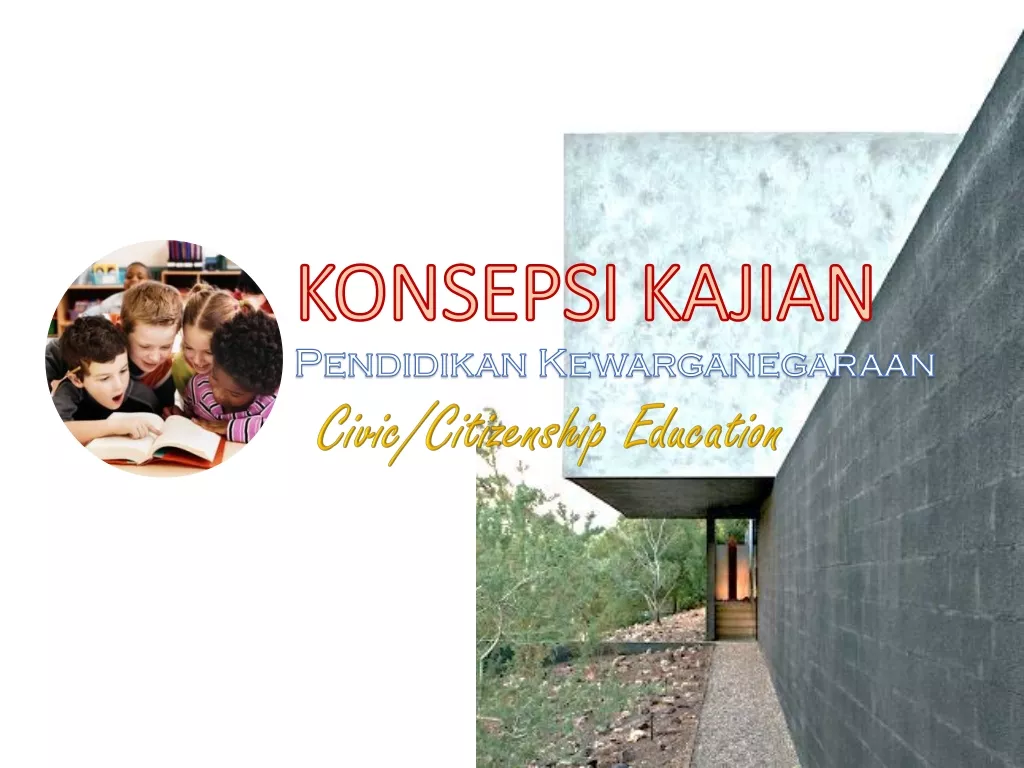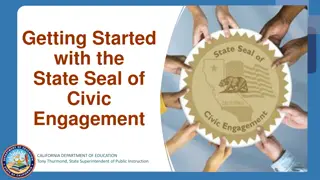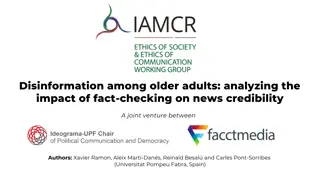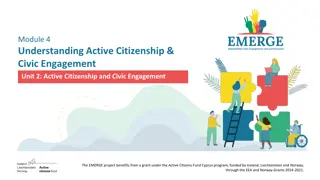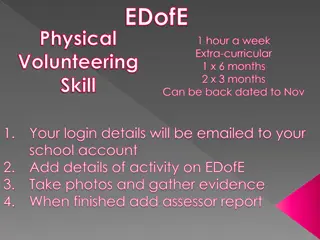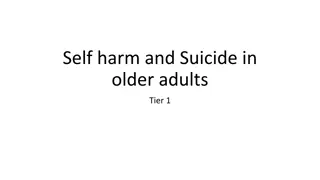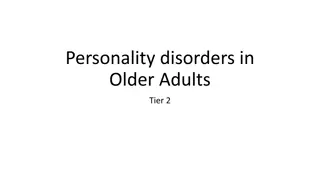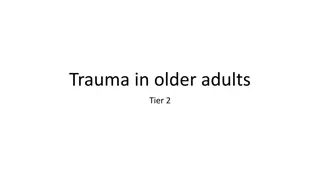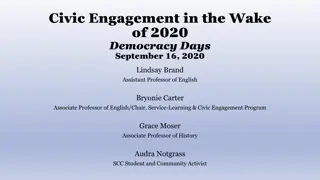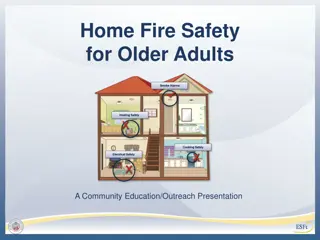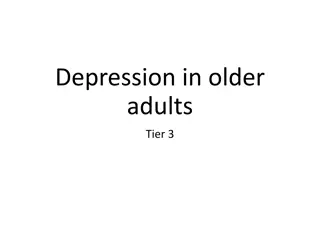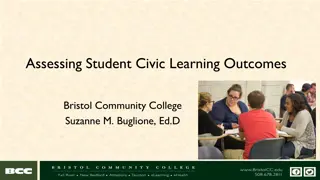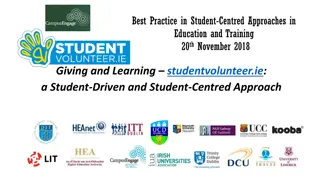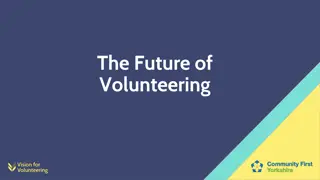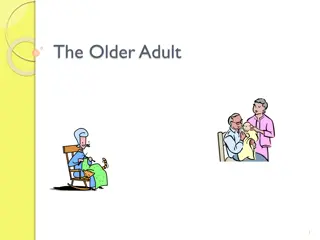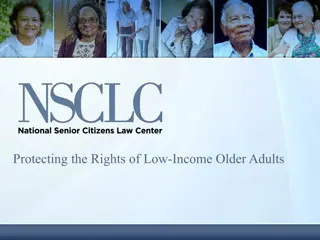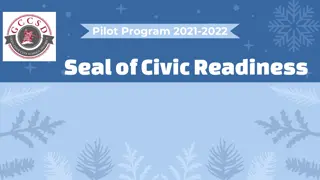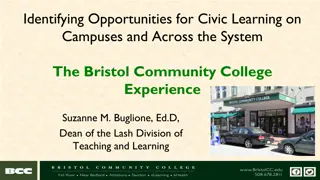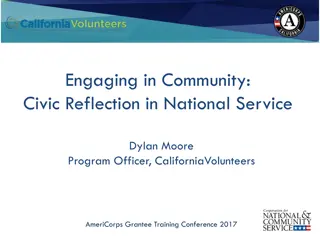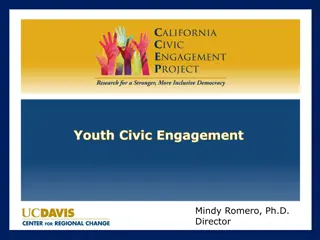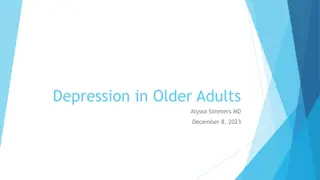Civic Engagement and Volunteering Among Older Adults in Washington, D.C.
Understanding the impact of civic engagement and volunteering on older adults in Washington, D.C. This study explores how older adults engage in community activities, the benefits they experience, and the reasons for emphasizing their involvement. Research highlights the importance of political participation, community engagement, and social connectedness for the well-being of older adults. Emphasizing the active role older adults play in society and the benefits they derive from volunteering can lead to increased quality of life, reduced mortality risk, greater life satisfaction, and improved psychological well-being.
Download Presentation

Please find below an Image/Link to download the presentation.
The content on the website is provided AS IS for your information and personal use only. It may not be sold, licensed, or shared on other websites without obtaining consent from the author.If you encounter any issues during the download, it is possible that the publisher has removed the file from their server.
You are allowed to download the files provided on this website for personal or commercial use, subject to the condition that they are used lawfully. All files are the property of their respective owners.
The content on the website is provided AS IS for your information and personal use only. It may not be sold, licensed, or shared on other websites without obtaining consent from the author.
E N D
Presentation Transcript
Older Adults: Engagement in DC DC Commission on Aging October 25, 2017 Emily Morrison, Ed.D. Emily McDonald
Purpose of the Pilot Study: How do older adults engage in the community through civic engagement and volunteering?
What comes to mind How do you define civic engagement? How do you define volunteering?
Working Definitions Civic Engagement: Individual and collective actions designed to identify and address issues of public concern. (American Psychological Association, 2017) Volunteer: Individuals who serve for, or through, an organization. (CNCS, 2017)
Why Civic Engagement and Volunteering? Engagement in society is known to profoundly affect [people s] quality of life (National Research Council, 2014, 1). Citizenship or civic participation consists of behaviors, attitudes, and actions that reflect concerned and active membership in a community. This includes the more traditional electoral citizenship activities, such as voting, serving on nonprofit boards or school boards, as well as less traditional forms of political participation, such as community organizing and social activism (CNCS, 2017).
Research says Engagement in society is: Political participation, Engagement in Community Organization, and Connectedness with friends, family, and neighbors (National Research Council, 2014).
Why Emphasize Older Adults? Americans are living longer than ever before (Federal Interagency Forum on Age-Related Statistics, 2016). Older adults age 60+ are the fastest growing segment of the population in most countries (WHO, 2015). DC is an Age-Friendly city with an active older adult population coming together to serve one another
Older Adults Who Volunteer: Have reduced risk of mortality, Experience greater life satisfaction and happiness, Enjoy better psychological well-being, and Suffer fewer depressive symptoms.
Gaps in the research People are more involved than what the research shows Volunteerism is often understood to only mean formal volunteer activities (Martinez et. al, 2011, p. 25). Research often does not include sporadic or infrequent activities Research is just emerging. Limited scope and demographic representation to date (Greenfield, Scharlach, Lehning, & Davitt, 2012; Scharlach, Lehning, Davitt, Greenfield, & Graham, 2017).
Methodology Qualitative Research Methods Focus Groups (Primary and Secondary Data) Individual interviews Participant Observation Document analysis IRB Approval Data collection May-July Data analysis and interpretation Member checks
Data Collection and Participants 1. Age-Friendly DC (AFDC) Community Consultations Focus groups facilitated by AFDC across DC January June 45 focus groups analyzed, 328 participants Three domains analyzed Social Participation Respect and Social Inclusion Civic participation and Employment
Data Collection and Participants 2. Community Anchor Interviews Community anchors are Village leaders, AFDC, local DC and nonprofit leaders Snowball sampling 7 interviews with community anchors 1 focus group with Village leaders
Data Collection and Participants 3. WAVE and Village Observations and Document Analysis Observations Public board meetings Village social events Member service call Document Analysis WAVE and individual Village websites WAVE meeting minutes Event calendars Newsletters Mission statements Brochures and handouts Presentation notes from WAVE board members
Data Analysis and Interpretation Transcription checking for accuracy Atlas.ti (data management) En vivo coding and constant comparative method Interrater reliability Comparison with the literature Analysis within each data source Analysis across data sources
Findings Language: Civic Engagement and Volunteering Ways That Older Adults Engage In Their Communities What hinders Older Adults Community Engagement What facilitates Older Adults Community Engagement Strategies Organizations Use To Foster Engagement
Language Used To Describe Civic Engagement and Volunteering voting, demonstrating, protesting, going to [city] council, testifying, writing letters to your congressperson or your council member, calling them on the phone ... doing Black Lives Matter...political organizing. I think the civic engagement piece I think it's a lot of people have the mentality that they just want to be able to give back.
Community Engagement Civic Volunteering as an aspect of civic engagement engagement as an aspect of volunteerism Civic Synonymous Volunteerism engagement
Ways That Older Adults Engage In Their Communities Formal roles Church involvement Community organization involvement (Villages) Charitable organization engagement (e.g., non-profits) Informal, personal initiatives I am the leader of a book club that s been going on for years. Caregiving a lot with friends and neighbors. I help my older neighbors. I know who needs what and help them get what they are looking for. [I] volunteer at [a] soup kitchen, and look after grandchildren.
Factors That Hinder Older Adults Community Engagement Poor communication from organizations We need to spread the word about multiple types of volunteer activities for people with different abilities, even homebound. A resistance to ask for help due to negative past experiences [My] attitude is I ll take care of myself. Stigmatization around asking for help Moms say, You can do this. You can do this. You don't need me; you can do this. People have to relearn to ask and appreciate how that [help] feels and what it does.
Factors That Hinder Older Adults Community Engagement Structural Ageism and Othering People don t speak. People act as if they are afraid of each other Barriers that hinder both giving and receiving help through community engagement are not mutually exclusive experiences
Factors That Facilitate Older Adults Community Engagement Direct outreach by organizations People want to be asked to be involved. Opportunities for people to people networking Inclusion and recognition of varying forms of giving back on the part of members by community organization
Strategies Organizations Use To Foster Community Engagement Inclusive language in describing organizational initiatives AFDC initiatives promoted as good for the whole community Prioritizing relationship building It s community, being in community. A few of my members have shared with me, [Emma], I'm afraid of dying at home alone.
Strategies Organizations Use To Foster Community Engagement Accommodating individual strengths and needs ED offering to bring groceries to members during a heat wave Recognizing varying forms of capital and varying levels of ability to contribute Time Talent Treasure Many of the people who need services also volunteered. I can't rake leaves for somebody, but I can use the computer. I can pick up somebody's mail. I can make phone calls or I can do paperwork. That's very common.
Reflections and Opportunities Enhancing research capacity of organizations Increasing visibility of older adults contributions to the community Setting an example for future generations Intergenerational experiences Older adults are part of decision-making bodies
What do YOU think? How do these findings align with your experience? What new questions emerge from these findings? How do we apply these findings? Are there current efforts are under way?
For more information Dr. Emily Morrison Director, Human Services & Social Justice; Assistant Professor, Sociology The George Washington University emily_m@gwu.edu
References cited American Psychological Association. (2017). Civic Engagement. Web.http://www.apa.org/education/undergrad/civic-engagement.aspx. Corporation for National and Community Service. (2017). Civic Engagement: Foundation of Democracy. Web. https://www.nationalservice.gov/sites/default/files/resource/foundationofdem ocracy.pdf. Corporation for National and Community Service. (2017). Glossary. Web. https://www.nationalservice.gov/vcla/glossary. Federal Interagency Forum on Aging-Related Statistics. (2016). Older Americans 2016: Key Indicators of Well-Being. Retrieved from https://agingstats.gov.docs/docs/LatestReport/Older-Americans-2016-Key- Indicators-of-WellBeing.pdf.
References cited Graham, C.L., Scharlach, A.E., Kurtovich, E. (2016). Do Villages Promote Aging in Place? Results of a Longitudinal Study. Jounral of Applied Gerontology. 1-22. Greenfield, E.A., Scharlach, A.E., Lehning, A.J., & Davitt, J. (2012). A Conceptual Framework For Examining the promise of the NORC program and Village models to promote aging in place. Journal of Aging Studies, 26, 273-284. Martinez, I. L., Crooks, D., Kim, K.K., & Tanner, E. (2011). Invisible Civic Engagement among Older Adults: Valuing the Contributions of Informal Volunteering. Cross Cultural Gerontology, 26, 23-27. National Research Council. (2014). Civic Engagement and Social Cohesion: Measuring Dimensions of Social Capital to Inform Policy. Washington, DC. The National Academies Press. http://doi.org//10.17226/18831.
A special thanks to Older Adults in the DMV DC Community Anchors
